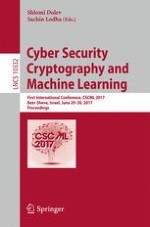
2017 | OriginalPaper | Buchkapitel
Efficient, Reusable Fuzzy Extractors from LWE
verfasst von : Daniel Apon, Chongwon Cho, Karim Eldefrawy, Jonathan Katz
Erschienen in: Cyber Security Cryptography and Machine Learning
Aktivieren Sie unsere intelligente Suche, um passende Fachinhalte oder Patente zu finden.
Wählen Sie Textabschnitte aus um mit Künstlicher Intelligenz passenden Patente zu finden. powered by
Markieren Sie Textabschnitte, um KI-gestützt weitere passende Inhalte zu finden. powered by